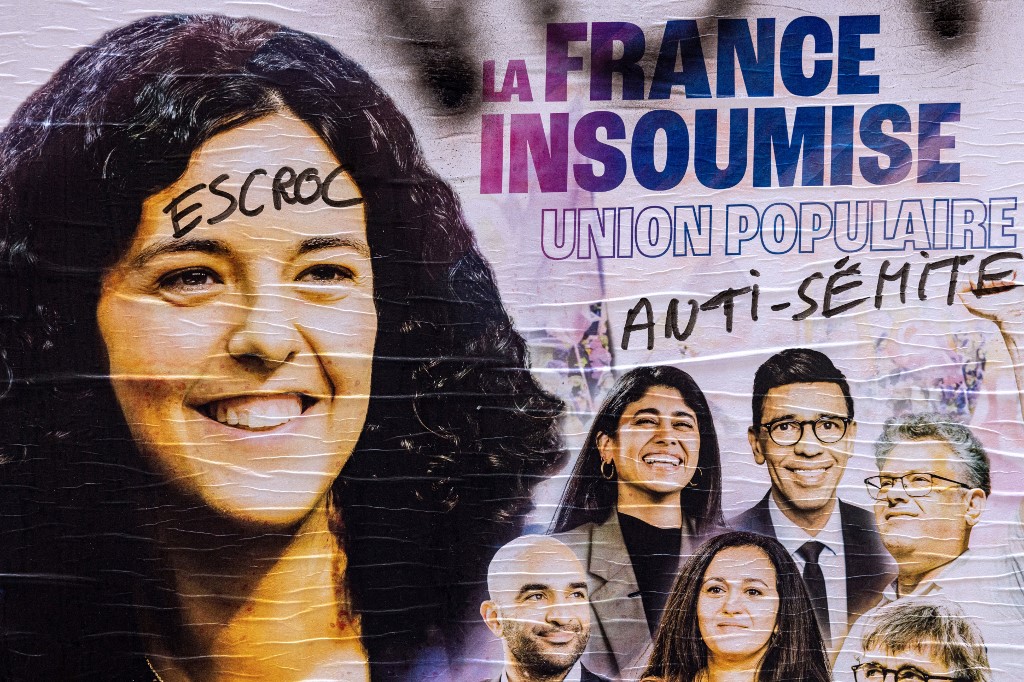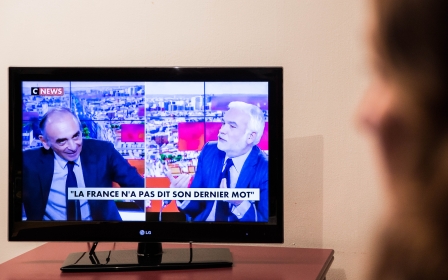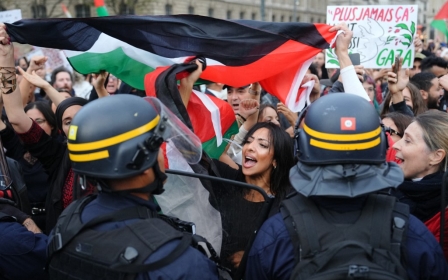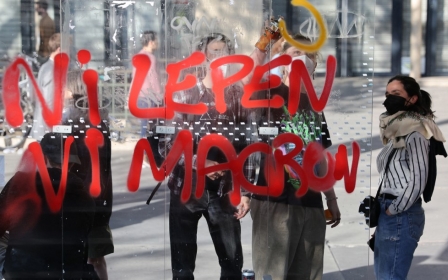EU elections: France's Muslims hope vote can help end 'criminal blindness' on Gaza
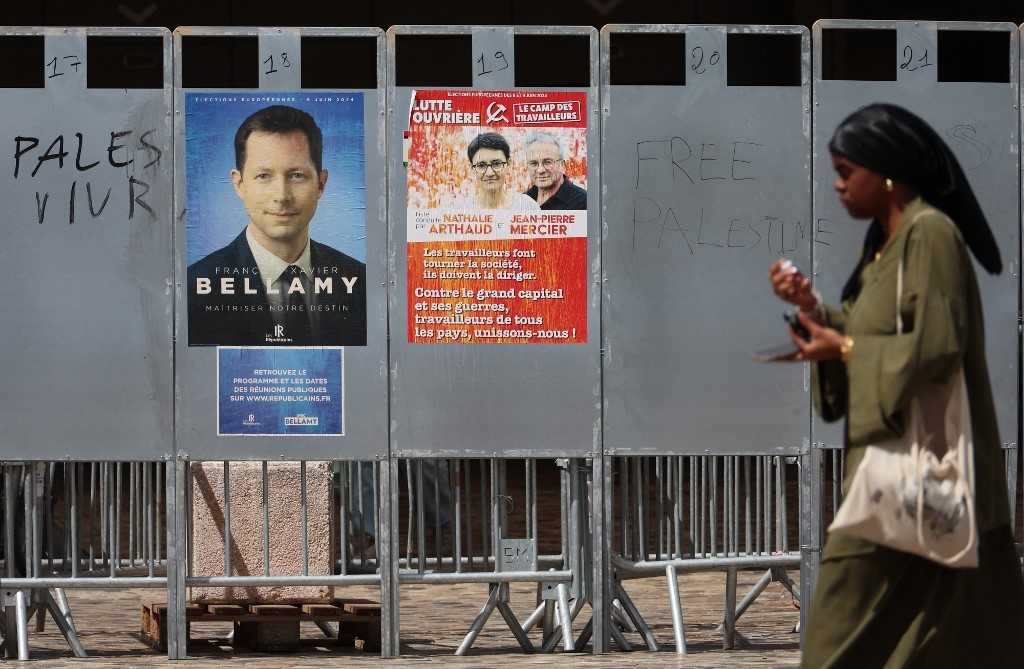
The rain pouring on the market of the council estate of Les Tarterets, in the city of Corbeil-Essonnes, 30km southeast of Paris, chased away customers.
On a Wednesday morning late last month, in front of his fruit and vegetable stall, Ahmed Salama, 43, a Frenchman of Egyptian origin, waited patiently for customers while listening to the news on the radio.
The incessant bombings of the Palestinian city of Rafah, in the south of the Gaza Strip, by the Israeli army was taking all his attention. “How can France and other European states tolerate the genocide of the Palestinian people without reacting?” he asked Middle East Eye bitterly.
“Babies have been beheaded, families decimated, thousands of people killed under the complicit gaze of political leaders who continue saying that Israel has the right to defend itself.”
A few days before, on 26 May, Israeli air strikes on a camp of displaced Palestinians in Rafah killed 45 men, women and children, tearing through their bodies and igniting a murderous blaze.
New MEE newsletter: Jerusalem Dispatch
Sign up to get the latest insights and analysis on Israel-Palestine, alongside Turkey Unpacked and other MEE newsletters
The footage of the aftermath drew horror and condemnation worldwide, including in France, where what is now known as “the Rafah massacre” fuelled the popular protest against the Israeli war on Gaza.
The military campaign, launched after an unprecedented Hamas-led attack that killed over 1,100 Israelis on 7 October, has caused the death of more than 36,550 Palestinians, mainly civilians.
'Always the same Islamophobic tune'
While Salama continued his indictment against political leaders, he was repelled by comments made on the RMC radio by Bruno Retailleau, president of the right-wing Republicans (Les Republicains/LR) party in the French Senate.
Retailleau accused the biggest left-wing group in the French parliament, France Unbowed (La France Insoumise/LFI), of exploiting the Israeli-Palestinian conflict to attract Muslim voters ahead of the European elections that are being held from 6 to 9 June.
Asked about an incident that took place the day before, when LFI MP Sebatien Delogu brandished a Palestinian flag in the National Assembly and was subsequently sanctioned by a 15-day exclusion, Retailleau accused the leftist party of “complete communitarian drift”.
“Why? Because behind this flag, there is cronyism. Behind this flag, there is the courtship of the Muslim clientele, of the Muslim vote... behind all this, there is anti-Zionism, antisemitism,” Retailleau said, adding that seeking the Muslim vote meant promoting “Islamist communitarianism”.
1 exclu, + de 100 autres de mobilisés ✊
— Sébastien DELOGU (@sebastiendelogu) June 4, 2024
Le drapeau 🇵🇸 est entré à l’@AssembleeNat, il n’en sortira plus jusqu’à ce que la 🇫🇷 agisse pour appliquer le droit international !
Fier de mes camarades @FiAssemblee à #directAN ! pic.twitter.com/OwK8oo7pr6
Translation: “1 excluded, more than 100 others mobilised. The Palestinian flag has entered the National Assembly, it will not leave until France acts to apply international law! Proud of my LFI comrades at the National Assembly.”
“Always the same Islamophobic tune,” Salama responded, while switching off the radio out of exasperation. Nervously stacking lettuces in a box to protect them from the rain, he criticised part of the political class, including the government, for discrediting any support for the Palestinians.
“Even if LFI has electoral aims, at least the party has the merit of giving visibility to the massacre of Palestinians in France, and putting pressure so as to stop that unconditional support for Israel,” Salama said, adding that he was ready to vote for Manon Aubry, LFI chief candidate for the European parliament.
In a bakery a few metres away, in the middle of the 2,300 housing units of Les Tarterets, an underprivileged neighbourhood mostly inhabited by people with an immigrant background, Salwa Brahimi, a 36-year-old social worker, told MEE that she, too, wanted to vote for LFI.
'Even if LFI has electoral aims, at least the party has the merit of giving visibility to the massacre of Palestinians'
- Ahmed Salama, stallholder
Its founder, Jean-Luc Melenchon, obtained the majority of votes in the district during the first round of the 2022 presidential election. While that year he obtained 21.95 percent of the votes nationwide, a poll carried out during the first round showed that most Muslims, 69 percent, voted for him.
“We are accused of communitarianism and separatism even though we have been penned in a ghetto where all the social scourges coexist: poverty, school dropout, drugs, etc,” the young woman said.
“And today, we are called antisemites because we are speaking out against the massacres of civilians in the Palestinian territories, which have been turned into open-air prisons for years.”
She said she hoped for the victory of the LFI list in the EU elections, in order to put an end to the “criminal blindness” of European political leaders about what is happening in Gaza.
'The demonisation of the Palestinian issue'
A poll by the Harris institute commissioned by the newspaper Challenges in April showed that 38 percent of Muslim voters in France intended to vote for LFI in the European election.
The study also showed that the situation in Gaza was the fourth largest issue motivating voters, after purchasing power, healthcare and employment.
The rector of the Grand Mosque of Paris, Chems-Edinne Hafiz, weighed in the electoral debate recently, calling on French Muslims to go to the polls in massive numbers to stand in the way of the far right, which he accused of “policies of exclusion, discrimination and division”.
That day, Hafiz received Rima Hassan, a Franco-Palestinian jurist, director of the NGO Observatory of Refugee Camps, and one of the top candidates on the LFI list for the EU elections, whom he described as “a renowned jurist, whose fight for vulnerable people in exile is exemplary”.
Hassan, like much of her party LFI, has been at the heart of the divisive debate which has shaken the French political class since the beginning of Israel’s war on Gaza in October.
Since then, activists have denounced what they see as the repression of actions of solidarity with Palestine: demonstrations have been banned, conferences have been cancelled, and the police have summoned activists for being “terror apologists”.
Both Rima Hassan and LFI leader and MP Mathilde Panot have previously been summoned by the police on suspicion of being “terror apologists” after they made pro-Palestine comments.
Hassan has been called a “Hamas mouthpiece” by Sebastien Chenu, an MP with the far-right National Rally (Rassemblement national/RN) and vice-president of the National Assembly.
Similarly, Marion Marechal, candidate for the European elections with Reconquest (Reconquete), the far-right party of former journalist Eric Zemmour, stated that “Rima Hassan and LFI are poison for democracy”.
'The parties which demonise the Palestinian question and stigmatise it by Islamising it push Muslim voters not to vote for them'
- Vincent Geisser, sociologist
For sociologist Vincent Geisser, research director at the French National Centre for Scientific Research and director of the Institute for Research on the Arab and Muslim World, “the radicalisation of anti-Palestinian remarks”, such as the ones Hassan has been subjected to, could further estrange Muslim voters from mainstream and far-right parties.
“The repression of opinion of support for Palestine and the demonisation of the Palestinian issue by making it look like a Muslim question could lead to a shift of French Muslims’ votes [away from those politicians],” he told MEE.
“The parties which demonise the Palestinian question and stigmatise it by Islamising it push Muslim voters not to vote for them,” he added, giving the example of Renaissance (RE), the party of the president of the Republic Emmanuel Macron.
In March, RE candidate for the EU elections Valerie Hayer claimed that there is antisemitism on the far left that "feeds on the situation in the Middle East and the antisemitism of Islamist terrorism, which kills Jews because they are Jews".
Fighting the far right
In addition to the issue of Palestine, Geisser believes that the presidential party could be penalised by the Muslim electorate because of government policies perceived as being increasingly Islamophobic, such as the so-called “anti-separatism” law of 2021.
Critics say the law is discriminatory against France’s estimated 5.7 million-strong Muslim community, the largest in Europe (between seven and 10 percent of the country’s 67 million inhabitants).
“In recent years, it has been the least Islamophobic candidates, the least tense ones on questions related to Islam, who have managed to attract French Muslim voters, as it is the case with Melenchon,” Geisser said.
A micro party, the Union of French Muslim Democrats (UDMF), has also been trying to mobilise this Muslim electorate since its creation in 2012.
During the 2019 European elections, the list chaired by its current president, Nagib Azergui, obtained 0.13 percent of the votes at the national level, hitting the highest points in Ile-de-France, the Paris region, especially in working-class neighbourhoods such as Le Val Fourre, where it took 17 percent.
For the upcoming vote, the party decided to join the Free Palestine coalition, which brings together parties from several European countries with the specific purpose of “making the voice of the Palestinian people heard” as well as “fighting against the contamination of far-right ideas targeting Muslim citizens”, according to Azergui.
“All European democracies are today contaminated by far-right theories which exclusively attack the presence and visibility of Muslims in Europe. It is an imminent danger against which we have decided to fight,” Azergui told MEE.
He believes that supporting Palestine is consistent with the European ideals, which he says are based on the opposition to systems of political domination and on the support for the self-determination of peoples.
'All European democracies are today contaminated by far-right theories which exclusively attack the presence and visibility of Muslims in Europe'
- Nagib Azergui, president of the UDMF
“It is very difficult to talk about the values of equality and freedom when we see European states unconditionally supporting a government in Israel run by fundamentalists and which practices apartheid,” Azergui added, in reference to reports made by several human rights organisations, including Amnesty International and Human Rights Watch, concluding that Israeli policies towards the Palestinians amount to apartheid.
In order to encourage people to vote for the Free Palestine list, the UDMF has been primarily active in working-class neighbourhoods.
Clearly positioning itself against LFI, which it accuses of courting Muslims for electoral reasons, the UDMF criticises Melenchon, in particular, for never speaking out against the government's closure of mosques and the dissolution of Muslim associations, such as the Coordination Against Racism and Islamophobia (CRI) and the Collective Against Islamophobia in France (CCIF).
“As for the question of Palestine, it is granted only four lines in their electoral platform,” said Azergui.
In Les Tarterets, Brahimi tries until the last minute to mobilise her friends and neighbours in preparation for the European elections.
“You can be French, Muslim and pro-Palestinian. It is not a crime but a right for which we must fight by going to vote.”
Middle East Eye delivers independent and unrivalled coverage and analysis of the Middle East, North Africa and beyond. To learn more about republishing this content and the associated fees, please fill out this form. More about MEE can be found here.


